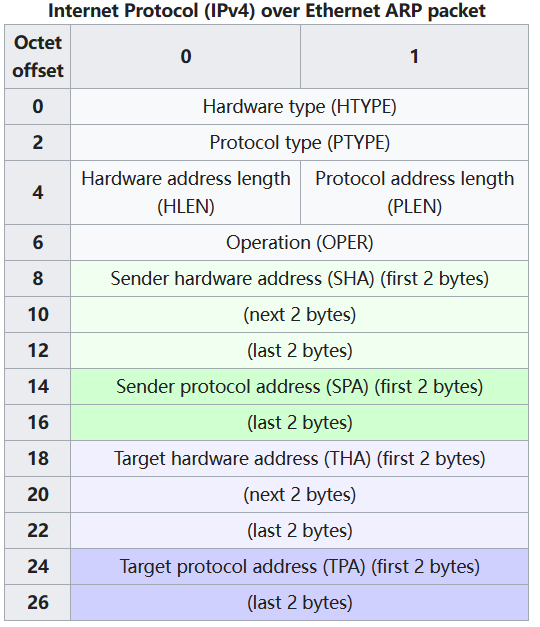1
2
3
4
5
6
7
8
9
10
11
12
13
14
15
16
17
18
19
20
21
22
23
24
25
26
27
28
29
30
31
32
33
34
35
36
37
38
39
40
41
42
43
44
45
46
47
48
49
50
51
52
53
54
55
56
57
58
59
60
61
62
63
64
65
66
67
68
69
70
71
72
| #include <stdio.h>
#include <stdlib.h>
#include <sys/socket.h>
#include <netinet/in.h>
#include <linux/if_ether.h>
#include <netinet/if_ether.h>
#include <linux/if_packet.h>
#include <net/if.h>
#include <string.h>
#include <net/if_arp.h>
#include <arpa/inet.h>
#include <unistd.h>
int main() {
int socket_fd = socket(AF_PACKET, SOCK_RAW, 0);
if (socket_fd < 0) {
perror("create socket failed");
exit(1);
}
struct sockaddr_ll local;
local.sll_family = AF_PACKET;
local.sll_ifindex = (int) if_nametoindex("eth0");
socklen_t local_len = sizeof local;
if (bind(socket_fd, (struct sockaddr *) &local, local_len) < 0) {
perror("bind dev failed");
exit(1);
}
getsockname(socket_fd, (struct sockaddr *) &local, &local_len);
unsigned char buf[256];
struct ethhdr *eh = (struct ethhdr *) buf;
struct ether_arp *arp = (struct ether_arp *) (eh + 1);
size_t size = (unsigned char *) (struct ether_arp *) (arp + 1) - buf;
memset(eh->h_dest, 255, ETH_ALEN);
memcpy(eh->h_source, local.sll_addr, ETH_ALEN);
eh->h_proto = htons(ETH_P_ARP);
arp->ea_hdr.ar_hrd = htons(ARPHRD_ETHER);
arp->ea_hdr.ar_pro = htons(ETH_P_IP);
arp->ea_hdr.ar_hln = ETH_ALEN;
arp->ea_hdr.ar_pln = 4;
arp->ea_hdr.ar_op = htons(ARPOP_REQUEST);
memcpy(arp->arp_sha, local.sll_addr, ETH_ALEN);
struct in_addr src_ip;
inet_aton("172.22.211.129", &src_ip);
memcpy(arp->arp_spa, &src_ip.s_addr, 4);
memset(arp->arp_tha, 255, ETH_ALEN);
struct in_addr dst_ip;
inet_aton("172.22.208.1", &dst_ip);
memcpy(arp->arp_tpa, &dst_ip.s_addr, 4);
while (1) {
if (send(socket_fd, buf, size, 0) < 0) {
perror("send arp failed");
exit(1);
}
printf("send arp success\n");
sleep(1);
}
}
|

